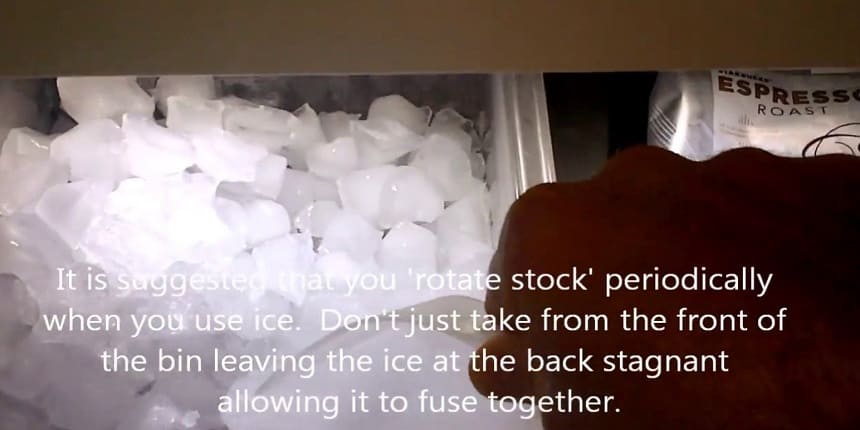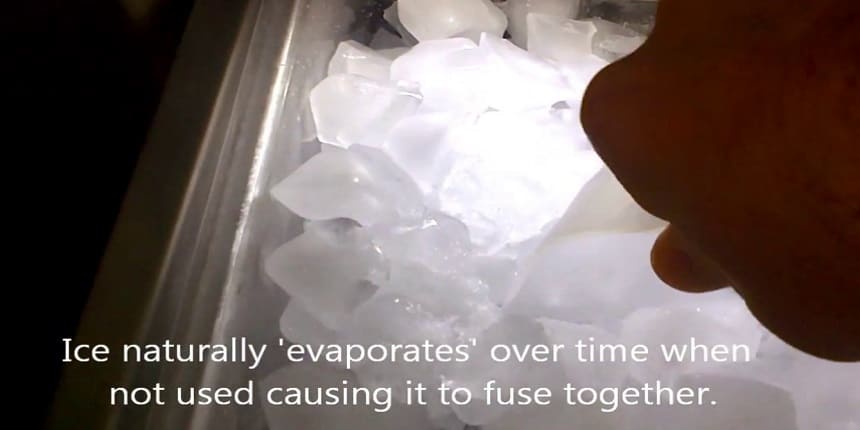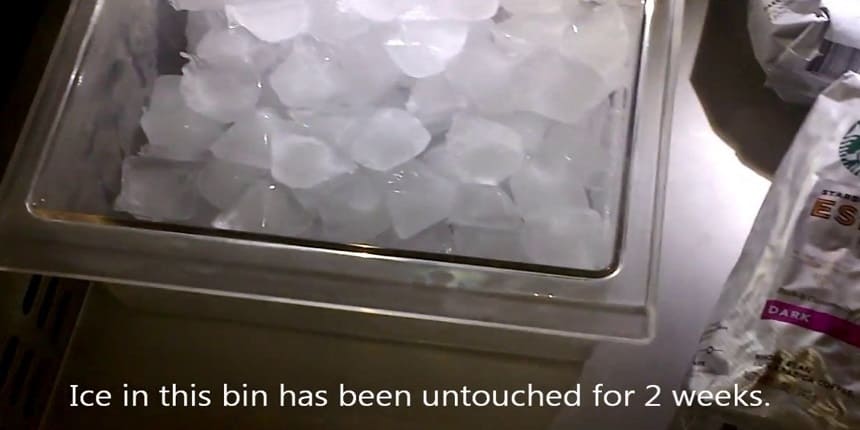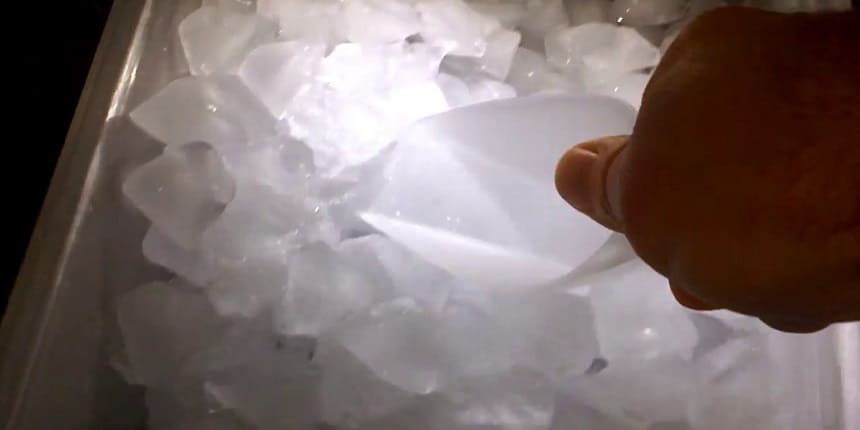Yes, ice can evaporate in the freezer due to a process called sublimation. But how?
Several factors can influence the evaporation of ice. And the myth about ice evaporation is whether ice can actually evaporate or not.
How Ice Forms In The Freezer – Can Ice Go Off In The Freezer?
Ice forms in the freezer when water molecules lose heat energy and freeze into a solid state. While ice can melt in the freezer due to temperature fluctuations, it does not evaporate in the same way as liquids do.

- Water molecules and temperature: The formation of ice in the freezer is a result of the interaction between water molecules and the temperature within the freezer.
As the temperature decreases below the freezing point of water, which is 0 degrees Celsius (32 degrees Fahrenheit), the water molecules start to lose energy.
- The role of freezing point: The freezing point of water is the temperature at which water transitions from a liquid state to a solid state.
When the temperature drops below this point, the water molecules slow down and arrange themselves into a crystal lattice structure, leading to the formation of ice.
- Formation of ice crystals: As the temperature continues to decrease, the water molecules arrange themselves into a distinct pattern, forming ice crystals.
These crystals grow and interlock with each other, resulting in the solid ice that we commonly see in the freezer.
Why Is My Ice Disappearing In My Freezer? – How To Stop Ice Cubes From Evaporating
Humidity Levels
Humidity plays a significant role in the evaporation of ice in the freezer. High humidity levels can cause ice to evaporate much faster compared to low humidity levels.
When the humidity is high, the moisture in the air can easily penetrate the ice and accelerate its evaporation process.
On the other hand, low humidity levels result in slower ice evaporation as the air surrounding the ice is drier.
Airtight containers also affect the evaporation rate of ice in the freezer. When ice is stored in an airtight container, it is protected from the outside environment and can retain its moisture.
This can slow down the evaporation process of the ice compared to when it is exposed to the air in the freezer.
The relationship between humidity and ice evaporation is crucial to understand when considering the storage and preservation of ice. Managing the humidity levels in the freezer and using airtight containers can help control the evaporation rate and prevent ice from evaporating too quickly.
Temperature Control
Ice in the freezer can indeed evaporate, but it largely depends on the temperature control settings.
Freezers typically offer different temperature options, such as a standard setting or a lower temperature for deep freezing. These temperature settings directly impact the rate at which ice evaporates.
For optimal ice preservation, it is recommended to set the freezer at the lowest temperature possible, usually around –18 degrees Celsius or 0 degrees Fahrenheit.
This temperature inhibits the evaporation of ice and helps maintain its solid form for a longer duration.
However, it’s important to be aware of temperature fluctuations in the freezer. Fluctuations in temperature can accelerate ice evaporation. If the freezer experiences frequent temperature fluctuations due to factors like door openings or improper seals, the ice may evaporate at a faster rate.
To prevent ice from evaporating rapidly:
- ensure that the freezer maintains a consistent and low temperature.
- Regularly check the seals on the freezer door to minimize temperature fluctuations.
By keeping these factors in mind, you can significantly reduce the chances of ice evaporating in the freezer.

Freezer Ventilation
Air circulation plays a significant role in the preservation of ice in the freezer.
Proper ventilation is crucial to maintain the ideal conditions for ice to freeze and prevent unnecessary evaporation.
The continuous movement of air inside the freezer helps distribute the cold temperature evenly, maintaining a consistent freezing environment.
To ensure optimal ice preservation, it is important to regularly clean and maintain the freezer.
A clean freezer promotes better airflow and reduces the chances of ice melting due to any obstructions or blockages. Regularly removing any frost buildup or food particles will help prevent ice from evaporating prematurely.
Furthermore, ventilation in the freezer aids in preserving the ice by preventing the accumulation of moisture. Properly ventilated freezers minimize the formation of frost, which can lead to faster melting and ice evaporation.
- proper air circulation and ventilation are crucial to preserve ice in the freezer.
- Maintaining a clean freezer and ensuring proper airflow
will help prevent ice from evaporating and ensure long-lasting ice preservation.
Can Ice Evaporate In The Freezer – Understanding Evaporation
Evaporation is the process by which a liquid changes into a gas state, escaping from its container.
It occurs when the molecules of a liquid gain enough energy to break the bonds that hold them together and escape into the surrounding atmosphere.
This process is influenced by factors such as temperature, surface area, and the presence of air currents.
Process Of Evaporation – How Does Ice Sublimate

Evaporation is the transformation of a liquid into a gas. This occurs when the liquid’s molecules absorb enough energy to break free from their liquid bonds and become gas molecules.
The energy required for evaporation is provided by the heat present in the environment.
As the liquid evaporates, its temperature decreases because heat is being used to convert the liquid into a gaseous state.
Is It Possible For Ice To Evaporate – Examples Of Evaporation
Evaporation is a common process that we encounter in our everyday lives.
Some examples include the drying of clothes when hung outside, the formation of steam when water boils, or the evaporation of sweat from the skin.
These examples demonstrate how heat can cause the molecules of a liquid to gain enough energy to escape into the air, thereby evaporating.
Ice Evaporate in the Freezer And The Freezing Process
Evaporation and the freezing process are interconnected in some ways.
When a liquid is subjected to low temperatures, it can still undergo evaporation, but at a slower rate.
The particles within the liquid have less energy to break away from their liquid form, but evaporation can still occur.
However, in a freezer, the low temperatures significantly slow down the evaporation rate, making it unlikely for ice to evaporate under normal circumstances.
Testing Ice Evaporation In The Freezer – How To Prevent Ice Cubes From Shrinking
| Scientific Experiments on Ice Evaporation | Controlled Conditions and Variables | Measurements and Observations |
|---|---|---|
| The phenomenon of ice evaporation has been a topic of interest for scientists in the field. Various experiments have been conducted to investigate this process in controlled conditions. | These experiments involve careful control of temperature, humidity, and air circulation within the freezer. Variables such as the size and surface area of the ice samples are also considered. | Measurements and observations play a crucial role in understanding ice evaporation. Scientists carefully monitor the weight loss of the ice samples over time to determine the rate of evaporation. They also observe any physical changes, such as the formation of frost or ice crystals. |
Debunking The Myth: Can Ice Actually Evaporate In The Freezer?
Ice evaporating in the freezer is a common misconception that has circulated for years. However, thorough analysis of experimental results reveals the truth behind this myth.

Analysis Of Experimental Results
A series of controlled experiments conducted by experts in the field shows that ice does not evaporate in the freezer.
When ice cubes are placed in the freezer, they undergo a process called sublimation, where they transform directly from solid to gas without passing through a liquid state.
This may create an illusion of the ice cubes shrinking, leading to the mistaken belief of ice evaporating.
Factors Leading To Misconception – Why Do Ice Cubes Shrink In The Freezer
Several factors contribute to the misconceptions surrounding ice evaporation in the freezer.
Firstly, the condensation that forms on the walls of the freezer may be mistakenly associated with the idea of ice evaporating.
In reality, this condensation is a result of moisture in the air coming into contact with the cold freezer walls and forming droplets.
Additionally, the rate at which ice cubes seem to “disappear” can be attributed to a phenomenon called sublimation. During sublimation, the surface of the ice cube shrinks, giving the impression of evaporation.
The Truth About Ice Evaporation In The Freezer
The truth is that ice does not evaporate in the freezer. It undergoes a chemical process known as sublimation, where it transforms directly from solid to gas without melting into a liquid state.
This misconception is likely due to the misinterpretation of condensation formed inside the freezer and the shrinking appearance of ice cubes undergoing sublimation.
So, rest assured, the ice cubes in your freezer may decrease in size over time, but they are not evaporating!
Final Words
Ultimately, ice can evaporate in the freezer due to a process called sublimation. This occurs when ice transforms directly into water vapor without going through the liquid phase. While it may seem counterintuitive, the freezer’s dry air and low pressure allow this process to happen.
Understanding this phenomenon can help prevent the wastage of frozen items and ensure the optimal performance of your freezer. So, next time you open the freezer and notice a disappearance of ice, you’ll know it’s just the magic of sublimation at play.
